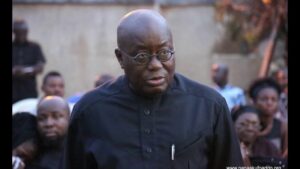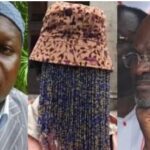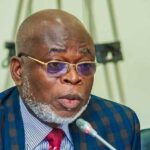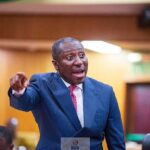 A private legal practitioner, John K. Akpalu has waded into the splitting of Volta Region debate saying the dividing the region does not make it develop.
A private legal practitioner, John K. Akpalu has waded into the splitting of Volta Region debate saying the dividing the region does not make it develop.
He said this in an article sighted by Awake News
[ads1]”I see two reasons given by the advocates for the Oti region – underdevelopment and difficulties in travelling to the present regional capital Ho, to transact official business. These two can be achieved without the expense and waste of a referendum. Dividing a loaf of bread into two does not make it bigger and dividing a region into two does not equal development.”
Read the full article:
LAWYER AKPALU EDUCATES AKUFFO ADDO
DIVIDING A LOAF OF BREAD DOES NOT INCREASE ITS SIZE. DEVELOP VOLTA REGION INSTEAD
By John K. Akpalu. Esq.
If President Akufo-Addo and the NPP government were as democratic and transparent as they claim, the President would have published a white paper by now on the Justice Brobbey Commission report on the creation of new regions and released the report so Ghanaians can determine the veracity, content and adequacy of the petitions which the President claims tied his hands under Article 5 of the 1992 Constitution and forced him to set in motion the process of dividing the Volta Region into Oti and Volta.
Statements that Justice Brobbey made at the beginning of his public hearing in the Oti area would lead some to question his impartiality in the whole process. He appears to have viewed his position as one to give imprimatur to a forgone conclusion. Moreover, creating the Oti region was one of President Akufo-Addo’s campaign promises, raising suspicion that the process would not be fair and impartial. Was it one petition, two petitions, five, ten? What reasons were given by the petitioners for the division of the Volta Region? Can their concerns be addressed through other means? These are all questions that can be answered with the release of the Justice Brobbey report. If the President chooses to stubbornly hide the report in the face of the continuing opposition to the division of the Volta Region, any negative consequences that emanate will lie squarely at his doorsteps.
Listening to President Akufo-Addo when he was recently confronted in Washington, DC about the Volta issue gives one the impression that he did not adequately think out the implications and appeared ill-informed. He makes false historical analogies, comparing the restriction of the partition vote to only those in the prospective Oti region to the 1956 plebiscite in which only the people of the trans-Volta Togoland voted. For one who was alive and an adult at the time of the plebiscite, President Akufo-Addo’s lack of historical knowledge of the times is disappointing – to say the least. A brief history lesson here.
The territory known as trans-Volta Togoland and present-day Togo belonged to Germany (as a colony) prior to the first world war. After her defeat in the war, this territory was taken from Germany and divided between Britain and France by the League of Nations (the predecessor of the United Nations). The French half was known as French Togoland (present day Togo) and the British half, British Togoland. These territories did not belong to Britain or France but were administered by them as trust territories on behalf of the League of Nations. After the Second World War, British Togoland and French Togoland became United Nations Trust Territories. Britain, all along was administering British Togoland with the then Gold coast. In 1954, Britain informed the United Nations that it could no longer administer the territory. It therefore, became natural for the UN to organize a plebiscite to determine if the people of British Togoland (Trans-Volta Togoland) wanted to formally join the Gold Coast or join French Togoland to form an independent country.
Contrary to the President’s faulty historical analogy, the plebiscite was organized at the behest of the United Nations and not by Britain and therefore, only the UN could determine who could partake in it. The UN had no power over the people of the Gold Coast then, to force them into any vote on whether British Togoland could join them. Secondly, the Gold Coast then was not a constitutional democracy but a colony, and Britain did not make any provision for the people of the Gold Coast to decide whether or not they would accept trans-Volta Togoland as part of Ghana.
President Akufo-Addo’s take on the Scotland Independence Referendum of 2014 on Scottish independence from the United Kingdom – which also, was held only in Scotland – also completely misses the point. The Kingdom of Scotland and The Kingdom of England were two independent countries until they voluntarily agreed in 1707 to join and become the Kingdom of Great Britain. The referendum of 2014 was pursuant to an agreement between the Scottish government and the UK government for the Scottish alone to decide if they still want to be united or reverse their 1707 decision and become independent. It would be absurd in the circumstances to extend the vote to the whole of the United Kingdom.
What the people of the Volta Region who are against the partition of the region appear to be saying is that the partition will affect the whole region and therefore, all views must be sought and the referendum must include the whole of the peoples of the Volta Region. This is not an unreasonable position and President Akufo-Addo and the NPP government must hear their arguments. Ghanaians must also know whether the government is acting only on behalf of a few petitioners or whether there is actually a groundswell for the division of the Volta Region. Any lack of transparency here will fuel suspicion of ulterior motives and a design to weaken the political power of the Volta Region.
I see two reasons given by the advocates for the Oti region – underdevelopment and difficulties in travelling to the present regional capital Ho, to transact official business. These two can be achieved without the expense and waste of a referendum. Dividing a loaf of bread into two does not make it bigger and dividing a region into two does not equal development. The government should rather spend the money slated for the referendum on building roads, schools, clinics and hospitals in the Oti area. A simple decentralization which obviates or reduces the necessity of coming to the Volta Regional capital Ho for official business, coupled with good infrastructure development in the area, should obviate the need for dividing the Volta Region and quell the present acrimony, ill-will and suspicion which, if not doused, could lead to instability in the peaceful country of Ghana which we have all come to love.
Source: AwakeNewsOnline.com | Efo Korsi Senyo












